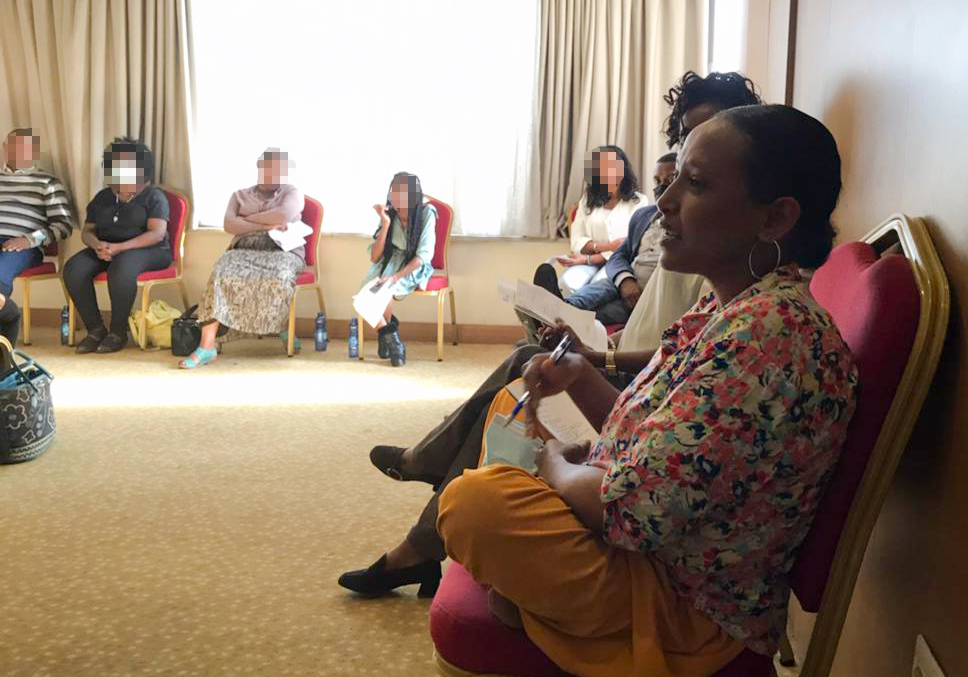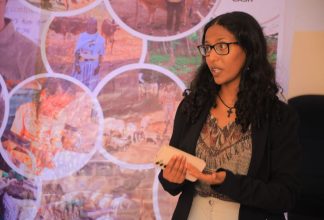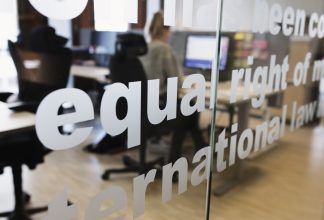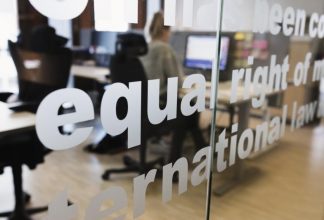“Women journalists should not cover politics”

The conditions for female journalists in Ethiopia are harsh. The country has limited freedom of press and the media world is heavily male-dominated. To change that, the Ethiopian Media Women Association and Civil Rights Defenders have formed a meeting place for female journalists. The aim is to increase women’s participation in the media.
“Without more women taking their place in the media and making their voices heard, we will not be able to have a democratic transition in the country,” says Aklile Solomon, Programme Officer at Civil Rights Defenders.
On chairs displayed along the walls of a hotel in Hawassa, Ethiopia, 11 women sit and talk about what it’s like to be a woman and work as a journalist in the country. The participants come from different organizations and media. Some work as presenters, others as field reporters. What they all have in common is that they are women, working in a male-dominated field, in a country with limited media freedoms.
“In the region where I live, women are considered less than men. This can be seen both in society and in the workplace. Managers bring their views of women into the workplace. When they oppress women at home, they do it in the office too. We are not respected, and they do not believe that we have the capacity to do the work even if we prove otherwise. A woman who works as hard, or harder than a man, still doesn’t get any recognition for it,” says Aberash Gebremedhin, a female journalist participating at this meeting.
“Managers bring their views of women into the workplace. When they oppress women at home, they do it in the office too.”
Ethiopia ranks 101th out of 180 countries in Reporters Without Borders’ list of the state of press freedom in the world. When current Prime Minister Abiy Ahmed came to power in 2018, it led to several reforms in the area of press freedoms, but more recently the conditions have deteriorated sharply. Journalists are imprisoned, often on dubious grounds, crimes against journalists are not properly investigated and it is difficult to access reporting from the conflict-torn areas of the country. It can also be difficult to get accurate information from official sources.
“The state of journalism and free speech has improved since 2018. More people dare to speak out openly both in the media and on social media. But there are still very big challenges. There is strong polarization and the media is still being used by the power to bring an agenda,” says one of the participants.
Hard issues for men, soft for women
The roundtable discussions are organised by Civil Rights Defenders and Ethiopian Media Women Association (EMWA). Here, participants get the opportunity to meet other women journalists, share experiences and support each other. The idea of the project is to increase networking and solidarity among female journalists. The goal is that it will lead to more women working as journalists and be able to take up more media space in the country.
“Women need to have equal rights and opportunities as men. No country can become a democracy without the full participation of women. Participation in democratic processes includes freely expressing your thoughts and opinions. Women’s participation in media, in all social, political and economic issues, is one way to guarantee their right and provide a gendered perspective,” says Aklile Solomon, Programme Officer at Civil Rights Defenders.
The roundtables have different themes and deal with issues such as hate speech and fake news, what it is like to work as a disabled journalist, or what it is like to work on covering the elections in the country. Many participants share that women journalists find it difficult to gain leading positions in the media, they often receive poor compensation for the work they do and they are often denied the chance to work on ’heavier’ issues. And if they were to protest, they fear they would lose their jobs. At one of the roundtables, a woman recounts a day when she was new to the profession and one of the paper’s editor-in-chief needed a journalist to cover a major political event in the country. The chief executive walked into the room where there were several female journalists and a female editor. To the great surprise of the participant, the female editor replied that there was no journalist who could take the assignment.
“I could not understand why she said there was no one for the mission when she was sitting in a room full of journalists, but she replied that we women should only work on social and health issues.”
Next step – more women in leadership positions
So far, there have been eight meetings and more than 120 women have participated. The participants continue to stay in touch through a chat group where they share information, come up with tips, and help each other.
“I used to think that this type of discrimination only occurred in my workplace, but when I came here and heard my fellow sisters talk about the same challenges, I understood that this happens everywhere. If we would have had an association like this before where we could have talked about our experiences, we could have found solutions together. Now that we have it, there’s no turning back. We will share what we have learned here with our sisters who work in the media and join forces to improve conditions for women in the industry,” says Aberash Gebremedhin.
The programme runs until March 2022, after which EMWA will continue the work itself. During the project, the organisation has grown stronger, gained more members and been able to acquire new, larger premises.
“Through the meetings, we have also gained ideas on topics that we need to work more on in order to try to improve the situation of female journalists. Both in our advocacy work and in various projects we run. Among other things, we will work to ensure that women receive the promotions they deserve. We need to get more women in leadership positions,” says Azeb Demeke, Program Manager at EMWA.


